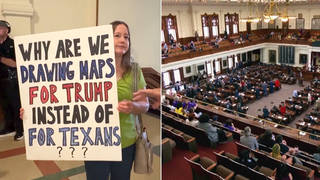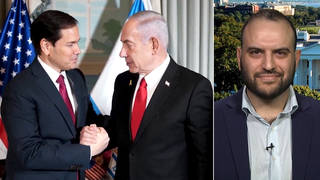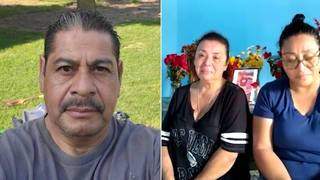
Guests
- Joshua YaffaMoscow correspondent for The New Yorker.
- Christophe Deloiresecretary-general and executive director of Reporters Without Borders.
We speak with Joshua Yaffa, a close friend of Evan Gershkovich, The Wall Street Journal reporter who has been jailed in Russia since his arrest last week, when he was accused of trying to obtain state secrets related to the Russian military — days after the United States indicted a Russian man in Brazil on espionage charges. Gershkovich’s parents left the Soviet Union for the United States before he was born, and he has reported in Russia since 2017. He faces up to 20 years in prison if convicted. Press freedom groups have denounced his arrest and urged Russia to immediately release him. Yaffa is The New Yorker's Moscow correspondent, where his recent piece is titled “The Unimaginable Horror of a Friend's Arrest in Moscow.” We are also joined by Christophe Deloire, secretary-general and executive director of Reporters Without Borders, which has called Gershkovich a “Russian state hostage.”
Transcript
AMY GOODMAN: We begin today’s show looking at the case of Evan Gershkovich, a Wall Street Journal reporter who was arrested and jailed last week in Russia on espionage charges. He faces up to 20 years in prison if convicted. Russia has accused Evan of trying to obtain state secrets related to the Russian military. He had reported in Russia since 2017. His parents fled the Soviet Union before he was born.
The Wall Street Journal accused Russia of arresting Gershkovich as part of a, quote, “calculated provocation to embarrass the U.S. and intimidate the foreign press still working in Russia.” Press freedom groups have denounced his arrest and urged Russia to immediately release him.
On Wednesday, U.S. Secretary of State Tony Blinken said Gershkovich was being wrongfully detained.
SECRETARY OF STATE ANTONY BLINKEN: In my own mind, there’s no doubt that he’s being wrongfully detained by Russia, which is exactly what I said to Foreign Minister Lavrov when I spoke to him over the weekend and insisted that Evan be released immediately.
AMY GOODMAN: Evan Gershkovich is reportedly the first U.S. journalist arrested on spying charges by Moscow since 1986. His arrest came just days after the United States indicted a Russian man who’s currently in custody in Brazil. The U.S. claims the man was a spy who attempted to infiltrate the International Criminal Court.
We go now to Berlin, where we’re joined by Joshua Yaffa, a close friend of Evan Gershkovich. Josh is a contributing writer to The New Yorker magazine and has been the magazine’s Moscow correspondent since 2016. He has recently been reporting in Ukraine. He’s the author of Between Two Fires: Truth, Ambition, and Compromise in Putin’s Russia. And Josh’s most recent piece is headlined “The Unimaginable Horror of a Friend’s Arrest in Moscow.”
Josh, thanks so much for rejoining us on Democracy Now! Can you start off by talking about how you know Evan? And talk about his history reporting in Russia and what he was doing before.
JOSHUA YAFFA: Well, the world of Western, and specifically American, reporters in Moscow is, by definition, tight-knit, simply because of its size, small even before the war, 10 or so, at max, people who were permanently based in Moscow writing for American papers. And it didn’t take long for all of us to get to know one another. I had been living in Moscow for some years when Evan arrived, didn’t take long to meet him.
I was immediately impressed by his energy, his spirit, his curiosity, his love for Russia. He is of Russian heritage. His parents were émigrés from the Soviet Union in the 1970s. Evan was born in America, very much American with that history, culture and upbringing, but nonetheless speaking Russian and with a deep appreciation for Russian history and culture. And it was that viewpoint that he brought to his coverage of Russia, inside or outside or both, having this deep familiarity with the Russian language and Russian culture, but also having the outsider view that allowed him to look at Russia critically and honestly, but with empathy and curiosity.
And that was a really, in Evan’s case, fruitful journalistic cocktail that allowed him to do really great work, first at The Moscow Times, where he started upon his arrival, an English-language daily in the capital, and then, later, The Wall Street Journal, where he started in January of 2022, as it turns out, just on the eve of Russia’s invasion of Ukraine. So he started this job just in advance of what would be the largest and most decisive journalistic story for all of us.
NERMEEN SHAIKH: And so, Josh, can you talk about the range of stories that Evan covered, not just while he was at The Wall Street Journal, but, as you said, working at The Moscow Times, and why you believe he was arrested now?
JOSHUA YAFFA: Well, I was impressed from the very beginning by Evan’s journalistic output — you might even say, at times, envious, in a collegial way. I remember his coverage at The Moscow Times of the pandemic in Russia, specifically the early days of the pandemic in Russia. And he did some really important, pathbreaking work, scooping, in fact, much or the rest of the American press corps in Moscow in those days, reporting on, for example, medical students from Russian universities who were forced into treating COVID patients, to doing some of the first work that looked at the statistics surrounding COVID in Russia, talking to statisticians, getting sources from inside the state statistics agency that suggested the government was downplaying the COVID toll in Russia. That was a story that gained momentum as the pandemic went on, but Evan was really among the first to look at it.
And going back even further, I remember a story he did about dying native languages in remote parts of Russia. He traveled to a region in Russia called Udmurtia, which has a number of its own native languages that are under threat, have been dying out since the Soviet period, come under even more pressure in post-Soviet Russia. And he wrote such an empathetic, interesting, compelling feature about these dying languages and the people who try and keep them alive. It was a really human story and one that I, again, found myself thinking, “Man, that was really interesting to read,” and I almost wished that I was the one to come up with it. But good for Evan for going off and reporting it.
And it was that type of curiosity, that type of sort of industrious, energetic reporting that he brought to his work at The Wall Street Journal and to the reporting of the war, which, as I said, began just a month after he started at the Journal. He was in Belarus shortly after the war began, where he saw Russian troops moving over the border into Ukraine, and also coming out of Ukraine as wounded being taken to hospitals in Belarus.
As to what might have prompted his arrest now, it’s hard to say. We’ve witnessed, since the start of the war, an unprecedented crackdown of the press in Russia, a further twisting of the screws even compared to the very difficult and very pressurized environment that the press operated in in Russia even in the years before. I don’t believe that this arrest has anything to do with Evan’s work, in the sense that he was, is an honest, straightforward, professional journalist doing journalistic work. In other words, I am convinced, as are all of his colleagues who have done this work from Russia over the years, that there was nothing even remotely close to espionage, or what is being alleged, in Evan’s work. He was doing journalistic reporting and investigations just like all of us. And he was arrested for reasons that remain opaque and unknown to me, but fit into a larger pattern and a larger trajectory of both an increasing crackdown and intolerance of the press, even the foreign press, in Russia and a environment of spiraling downward relations between Russia and the United States. And if, indeed, Russia’s goal here is to trade Evan for someone that it wants back that is in U.S. or European custody, this would also not be the first time. We saw this last year with the arrest and trade of the basketball player Brittney Griner, for example. So, this would fit into an existing pattern of Russian behavior.
NERMEEN SHAIKH: Josh, we’ll return to that, how this might be — these might be the conditions under which Evan is released, but I want to go to what you talked about. First of all, in the piece, you said that you don’t believe that he could have been arrested without Putin’s approval, with the Kremlin spokesperson saying that Evan had been caught, quote, “red-handed.” So, on the one hand, you have that, the likely state involvement, I mean, at the level of the Kremlin’s involvement in his arrest, and then his Russian journalist independent media colleagues who have come out in massive support for Evan — a New York Times piece headlined “He Told Their Stories of Repression. Now They Are Telling His.” So, if you could speak about his relationship to local Russian journalists? He was apparently known — The Wall Street Journal reported he was known by his Russian friends not as Evan, but as Vanya.
JOSHUA YAFFA: Well, that’s right, “Vanya” being essentially the Russian equivalent of “Evan.” And that just speaks to the degree to which Evan was integrated into Russian society, really became a local, even in just a few years living in Moscow. That’s partially thanks to his knowledge of the language and to his knowledge of the culture and history that he arrived to Russia with, but also speaks to his personality. He’s just a friendly, open, gregarious, really funny guy, funny in both English and Russian, makes people around him feel good, feel comfortable, make them laugh. And he did a remarkable job of making friends, and making friends, first and foremost, in the journalistic community in Moscow, not only among the foreign journalists, as I spoke to a few minutes ago, but, as you mentioned, Russian journalists, our peers.
In fact, this is the open secret of being a foreign correspondent anywhere in the world, Moscow included, that part of the job is befriending the locals, the local journalists, who have extensive knowledge of the context, deep contacts within society, have their antenna up to stories that we might miss. And those relationships, friendly, professional, collegial and otherwise, are, one, just wonderfully enriching personally, but also professionally help us do our job. And people within the Russian journalistic community, people who work at Russian independent outlets, whether print, online, TV, had a great fondness and respect for Evan, Vanya. And it’s no surprise that they’ve turned out in support for him, because Evan, like all of us, but Evan specifically, did such a good job of covering the many ways that the Kremlin put pressure on Russian independent journalists over the years, launching criminal cases against them, labeling them so-called foreign agents, driving them out of the country. And now is the time in which Vanya is in trouble, and they are really rallying to his support.
AMY GOODMAN: Do you think the Kremlin is particularly threatened by Western journalists who have this deep knowledge of Russia? Talk about his parents, Evan’s parents, coming to the United States from the former Soviet Union as émigrés, and his deep knowledge of Russia, and then where he was picked up, in Yekaterinburg, the significance of what he was doing there.
JOSHUA YAFFA: Right. Well, as we talked about, Evan’s parents were born in the former Soviet Union, arrived to the U.S. in the late ’70s. Evan himself was born in the U.S., is only a U.S. citizen, but grew up with really a foot in both worlds, steeped in American culture, a child of the ’90s and early 2000s, but also having Russian parents who imparted on him not just a knowledge of the language but of the entire cultural architecture that comes with it, starting with cartoons as a young child and going all the way up to contemporary pop culture, with Evan himself — immersed himself in.
And like we’ve talked about, that knowledge allowed him to really hit the ground running when he arrived in Moscow to work as a reporter five or so years ago, and it allowed him to penetrate very quickly and very deeply Russian society, gain sources, navigate a very difficult reporting environment in Russia. Even before the war, it was not the easiest place to show up and begin to work as a journalist, but Evan was able to make contacts and develop sources relatively quickly and relatively deeply.
At the time of his arrest, Evan was one of a handful of American reporters left in Moscow. Many departed Moscow after the start of the war. Last March, Russia passed a series of wartime censorship laws that effectively criminalized any honest or factual reporting about the war. That law has been used several times against Russian citizens and Russian journalists, but it has not been used against Western or American journalists. And that led all of us, Evan himself, to think that there continued to be a particular niche or safe space for foreign journalists to operate in Moscow, that we were free from the kind of repressive laws and pressures that Russian journalists faced. And that gave us both a sense of duty and responsibility, but also a bravery of a sort, that we were representing or had a protected category, and that allowed us to move around the country and report on stories and subjects that had become very problematic, if not impossible in many cases, to do for our Russian colleagues.
And Evan reported extensively on the aftermath of the invasion in Russia, what it meant for Russian society, what it meant for Russian economy. He was among a number of authors — four, I believe — of a massive investigation that came out in December about exactly how Putin himself gets information about the war, the degree to which Putin is isolated and doesn’t necessarily get the most factual or up-to-date information about what his army is doing or achieving or not achieving on the ground in Ukraine.
He was arrested, as you mentioned, in Yekaterinburg, a city in the Ural Mountains. He was working on another story, by all accounts, connected to the Russian military effort, and just shows the degree to which Evan is, remains a committed reporter devoted to the story, devoted to telling the story with as much facticity as possible. And that means he was going places that other reporters weren’t necessarily going, like, for example, Pskov, another town in northwestern Russia where Evan went earlier this year, published a piece earlier this spring about Pskov and the reaction in Pskov, home to a number of Russian military units that suffered heavy losses in Ukraine, to gauge the local reaction there. And I and readers really benefited from these on-the-ground, very tactile and detailed reports.
NERMEEN SHAIKH: And, Josh, finally, we only have a minute. You said in the piece that espionage trials in Russia almost always end in conviction, are held entirely in secret, and talked about what the possibility is for a prisoner exchange, especially given the fact that a lot of Russians that the Kremlin is interested in getting back are held not in the U.S., but in Europe. And one of the people you mentioned who might be the person with whom an exchange might take place is Vadim Krasikov. So, if you could just elaborate on these things?
JOSHUA YAFFA: Sure. I mean, this is definitely in the realm of speculation at this point. We don’t know exactly what the Kremlin wants. The idea that the Kremlin has in mind a trade and, effectively, has taken Evan as hostage seems likely, but not yet confirmed. If anything, Evan should be freed simply because he is innocent, not because he could be traded for someone that Russia wants back.
But there are a number of figures linked to the FSB, like this assassin, Vadim Krasikov, who killed a Chechen in Berlin’s Tiergarten some years ago, now held in German prison, has connections to the FSB. That could be someone that Russia wants back. Of course, if the person that Russia requests in exchange for Evan is being held in European custody, that will complicate the process, because that means it is not simply up to the U.S. to release that person, but would have to gain the agreement of a European country. All of that could potentially make negotiations more complicated. But, really, I want to emphasize that that’s just speculation at this point, and Evan should be freed because he is unjustly imprisoned and charged with false charges, not because he is of value as an exchange hostage.
AMY GOODMAN: Joshua Yaffa, I want to thank you for being with us, close friend of Evan Gershkovich, contributing writer to The New Yorker. We will link to your piece in The New Yorker magazine, “The Unimaginable Horror of a Friend’s Arrest in Moscow.” Thanks for joining us from Berlin, as we turn now to Paris to speak with Christophe Deloire. He is the secretary-general of Reporters Without Borders, director of Reporters Without Borders.
I want to ask you both about what you have said, Christophe, about Evan’s detention — you said the U.S. journalist detained in Moscow is clearly a Russian state hostage. And then we’re going to talk about what happened to you this week. You just came back from London, where you were denied a visit with WikiLeaks founder Julian Assange, the WikiLeaks publisher who has spent the last four years locked up at the Belmarsh high-security prison in London while awaiting possible extradition to the United States, where he, like Evan, is being charged with espionage, but he faces 175 years in a U.S. prison. His crime? He released information about U.S. military in Iraq, in Afghanistan, State Department logs for decades. So, start off with Evan, and then move on to Julian Assange.
CHRISTOPHE DELOIRE: So, Evan is clearly a Russian state hostage, a sort of institutional hostage. If the Russian authorities would have a sort of good faith, they would have clearly exposed some elements about what they have. As you mentioned previously, according to the spokesperson of the Kremlin, he was arrested — he was caught red-handed. But, after all, what did we have? Nothing. We saw or we could notice a lot of violations of the rights of defense, the legitimate rights that a suspect should enjoy. For instance, the media were prevented from entering the courtroom. His own lawyer could not enter the courtroom when the decision to put him in detention was made.
And now such elements, and also the lack of concrete evidences, that clearly show that the Russian authorities have bad faith, that they have taken him because he was reporting in a city with a military complex. And they said this is spying. It constitutes spying to just report, investigate in a city with a military plant. But if I have a look at what they officially said, the FSB said he went there, Evan, to gather information about the Russian military-industrial complex that constitutes a state secret. But that’s legitimate for a journalist to look for state secrets. It doesn’t define spying. So, clearly, this is why we defend Evan.
And clearly, beyond his case, this is a way to intimidate journalists, foreign journalists in Russia, in the country. We know how Putin succeeded in the past decade — he finalized it right after the beginning of the war — how he succeeded to extinguish, to resuppress pluralism, independent journalism, to provoke an extinction in his own country, I mean, about Russian journalism. But some correspondents continue to — some foreign correspondents continue work in Moscow and other cities. A lot of them left previously, as Evan’s friend mentioned. But some of them stayed. For instance, French correspondents are there. But now, clearly, what happened to Evan is an intimidation for them.










Media Options